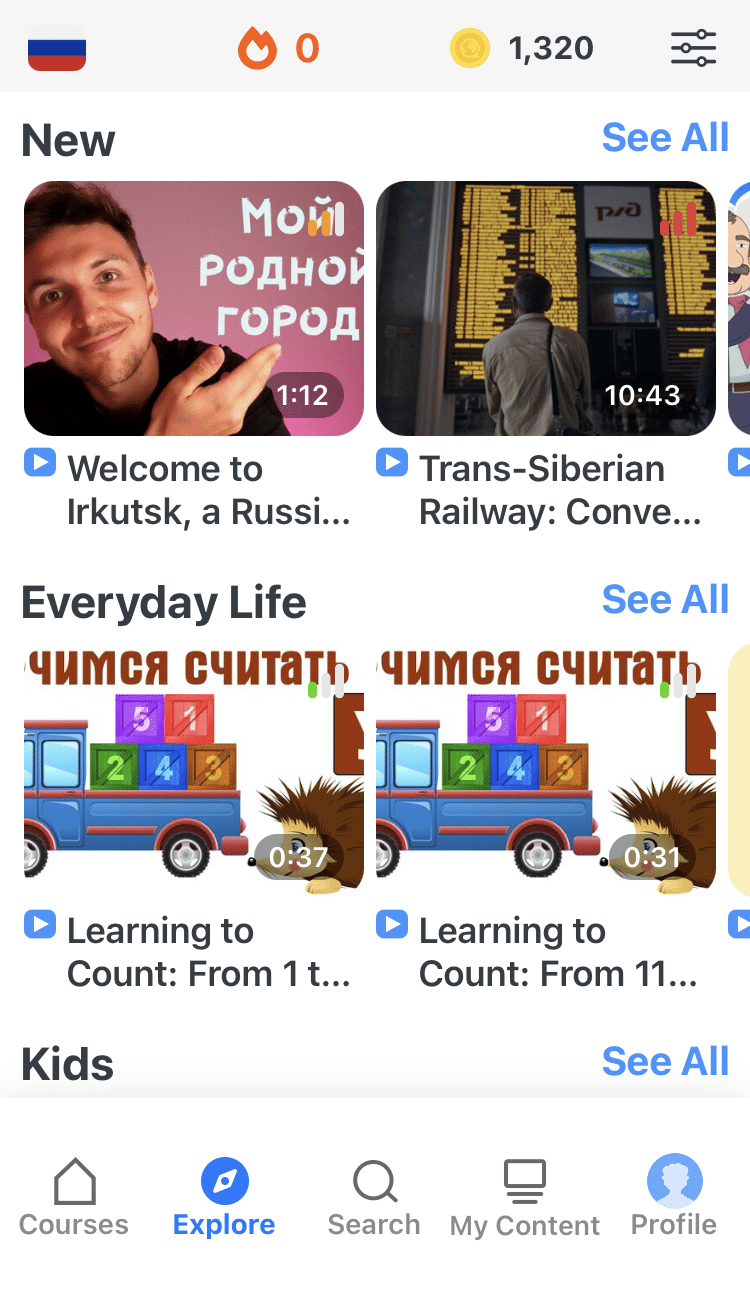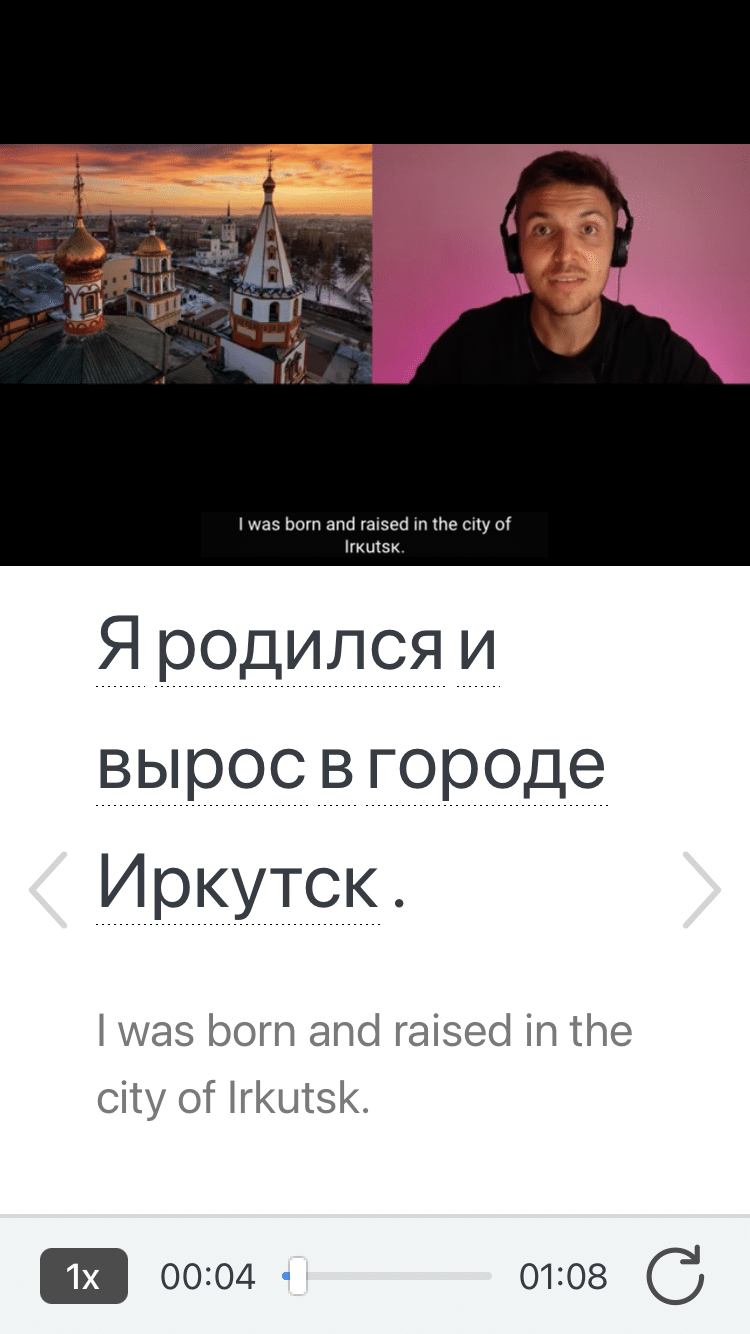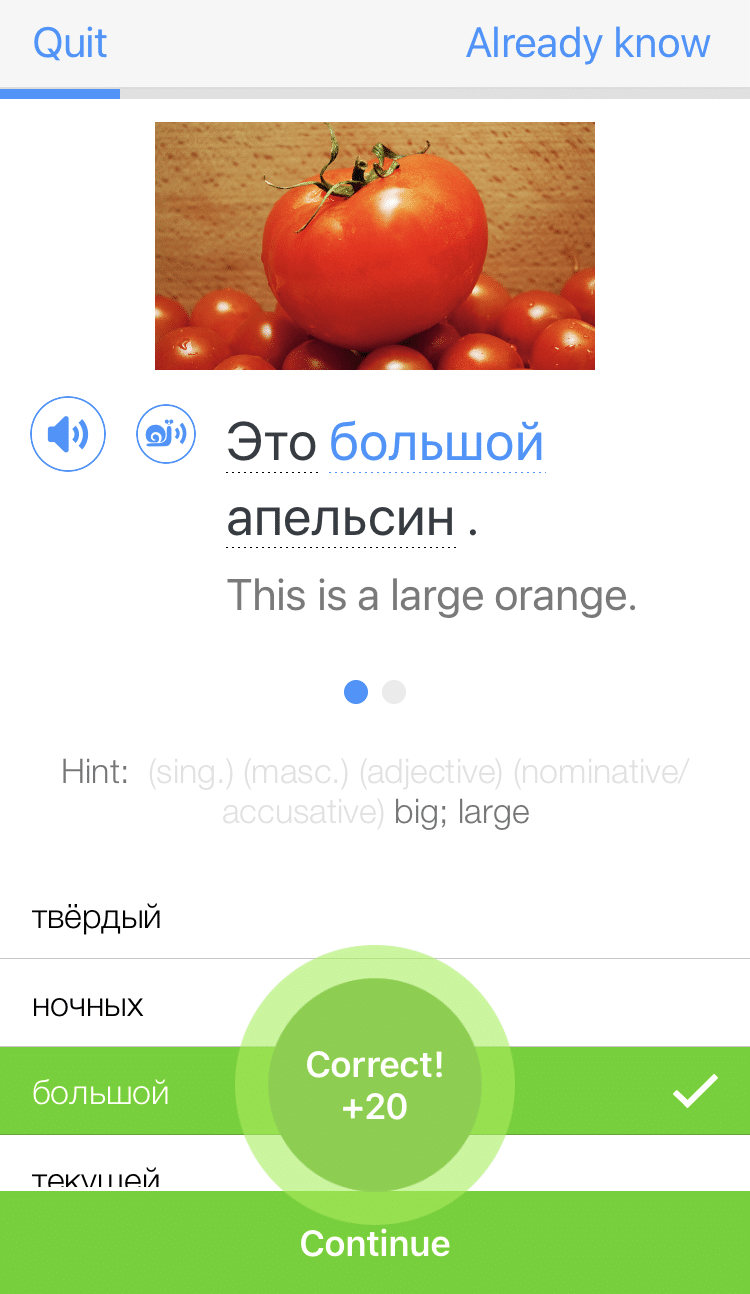
Learn Russian with Music: 15 Easy Songs to Rock Your World
Whether you’re listening to the radio or putting together a list of Russian audio resources, music is one of the best ways to learn a language quickly.
In fact, listening to easy Russian songs really helps to improve your listening skills.
So if you want to master Russian in a way that’s as effective as it is habit-forming, it’s time to start singing a new tune!
Just note that translations of lyrics can vary. Some are literal while others take a more artful approach.
Additionally, since some of these songs have multiple versions, there may also be variations between the videos and lyrics linked below.
Contents
- 1. “Катюша” (“Katyusha”)
- 2. “Чебурашка” (“Cheburashka”)
- 3. “Пусть бегут неуклюже” (“Gena’s Birthday Song”)
- 4. “Чёрный ворон” (“Black Raven”)
- 5. “Выше” (“Higher”)
- 6. “Я сошла с ума” (“All the Things She Said”)
- 7. “Хочешь” (“Do You Want?”)
- 8. “Милая” (“Darling”)
- 9. “Калинка” (“Kalinka”)
- 10. “Моё сердце” (“My Heart”)
- 11. “Что такое осень” (“What Is Autumn”)
- 12. “Ой, да не вечер” (“Oh, It’s Not Evening Yet”)
- 13. “В лесу родилась ёлочка” (“A Pine Tree Was Born in the Woods”)
- 14. “Mама — первое слово” (“Mama is the First Word”)
- 15. “Куда уходит детство” (“Where Does Childhood Go?”)
- Why Learn Russian with Songs?
- How to Learn Russian with Songs
- And One More Thing...
Download: This blog post is available as a convenient and portable PDF that you can take anywhere. Click here to get a copy. (Download)
1. “Катюша” (“Katyusha”)
This folk song rose to fame during World War II. It tells the sad story of a young woman waiting for her lover who is away at war. The first couple verses are in the past tense, so it’s a great way to practice your conjugations.
You may also want to review the lyrics on their own.
2. “Чебурашка” (“Cheburashka”)
This is the theme song from the popular Soviet-era cartoon “Cheburashka.” If you’re not yet familiar with “Cheburashka,” prepare to say “aw…” That’s right: “Cheburashka” is downright adorable. So adorable that this peculiar little animal “unknown to science,” who ends up as a toy in a store, has even become popular outside of Russia (particularly in Japan).
The lyrics rhyme and are quite easy and enjoyable to learn. Plus, you’ll never forget how to say, “Now I’m Cheburashka.” I’m sure this must be a valuable conversational tool in some situations.
3. “Пусть бегут неуклюже” (“Gena’s Birthday Song”)
This is another classic song from the “Cheburashka” series. People still frequently sing it on birthdays. While it will help you learn the phrase “Happy birthday,” learning the lyrics will also help prepare you in case you ever find yourself at a Russian birthday party.
4. “Чёрный ворон” (“Black Raven”)
This Cossack folk song is about a black raven circling overhead as a soldier is dying. You’ll never forget the word for “black” again. Also, the song is primarily in the past tense, so it’s a helpful way to practice your conjugations.
The Russian lyrics vary a little between versions: You can look at some alternate lyrics here.
5. “Выше” (“Higher”)
Listening to this song by НЮША (Nyusha) is a great way to learn Russian because it’s energetic without being as fast as a lot of pop music.
Nyusha is a popular Russian singer-songwriter. Much of the lyrics are in the future tense; this will help with your conjugations. The phrase “I want” is also frequently repeated, so you’ll have no trouble remembering it.
6. “Я сошла с ума” (“All the Things She Said”)
This song is by Тату (t.A.T.u.), one of the few Russian groups to experience a good deal of success in the US. This song was one of their big hits. Granted, its popularity overseas was partially due to the video’s controversial kiss between the two girls in the group. It’s an entertaining song, and its extremely repetitive lyrics are easy to learn.
You can even listen to the English version to compare the lyrics (which, be warned, are very different).
7. “Хочешь” (“Do You Want?”)
This song by popular rock musician Земфира (Zemfira) is great for anyone who wants to study Russian with song lyrics alongside some cool guitar riffs. It will certainly help you learn the phrase “Do you want…?” and the lyrics are repetitive, so you’ll have lots of opportunities to reinforce what you just learned without having to pause the song.
8. “Милая” (“Darling”)
This song by the Pop duo Непара (Nepara) is very romantic. “Darling” is pretty slow-moving, which will make it easy to catch the lyrics, included in the link above. Plus, if you’re looking for a good Russian term of endearment, this song hands it to you on a silver platter.
9. “Калинка” (“Kalinka”)
This is a famous Russian folk song, probably the best-known Russian song around the world, written by composer and folklorist Ivan Larionov in 1860. This upbeat old folk tune will have you tapping your feet.
While the lyrics may not teach a ton of valuable vocabulary for everyday use (unless you really need to know the Russian word for a type of berry), you’ll certainly learn the verb for “to sleep.” It’s also a fun way to practice the different sounds of the language.
10. “Моё сердце” (“My Heart”)
This is a pop/rock song by the Russian group Китай (Kit-i). The lyrics to this song go by slowly, so you’ll be able to pick up every “my heart” and “I know you love me.” Bonus social tip: While this last phrase is a great thing to know how to say in Russian, you might not want to go around just telling people that.
11. “Что такое осень” (“What Is Autumn”)
The lyrics of this song, by Yuri Shevchuk, the lead singer and original member of the popular Russian rock band ДДТ (DDT), bring to life the epitome of a real Russian autumn.
The song provides an opportunity to learn vocabulary to describe seasons and weather, as the singer describes a cloudy fall sky, rainwater, puddles, wind and falling leaves.
12. “Ой, да не вечер” (“Oh, It’s Not Evening Yet”)
Pelageya, a Russian folk singer, shares a bit of Russian history when she sings about Stepan (Stenka) Razin, a Cossack leader who was responsible for an uprising against the royalty and nobility in Southern Russia in the late 1600s.
The song describes a dream that Razin had in which he envisioned his own death. The lyrics offer a great opportunity to observe word tenses in Russian. After listening to the words sung in Russian, read the lyrics here.
13. “В лесу родилась ёлочка” (“A Pine Tree Was Born in the Woods”)
“В лесу родилась ёлочка” is an easy song to understand and sing along to because it’s slow and the words are sung very clearly.
This song is a favorite among Russian children to sing during the Russian New Year! A big part of learning about a country’s culture is being familiar with the holidays, and there’s no bigger holiday in Russian than this one!
You might be surprised that the New Year is celebrated in a very similar way to American Christmas. Families decorate pine trees and a Santa Claus-type figure (called Grandpa Frost) leaves presents under the tree at midnight.
The interesting distinction is that the Russian New Year is a secular holiday, and an Orthodox Russian Christmas is celebrated on another day.
14. “Mама — первое слово” (“Mama is the First Word”)
When learning Russian, it’s fitting to hear a song about most children’s first word in many languages—mama. This song is performed by the children’s music group Непоседы (Neposedi), which refers to fidgety children not able to sit still.
The song is very easy to follow, as the lyrics are sung slowly and clearly. Read the accompanying English translation to learn the Russian words, while listening to their pronunciation.
15. “Куда уходит детство” (“Where Does Childhood Go?”)
It’s not possible to discuss Russian songs without an honorable mention of the most famous Russian singer of all time, Алла Пугачева (Alla Pugacheva).
In this hit from 1977, Pugacheva reminisces about the joys of childhood and the sentimental feelings of remembering your younger years as you grow older.
As it talks about trying to find your childhood, this song actually provides helpful vocabulary to use in conversation should you need help in finding a location in a Russian-speaking country. Great examples are найти (find), попасть (get there) and здесь (here).
Why Learn Russian with Songs?
- It’s fun. Think about it. There are lots of great songs in Russian that you probably don’t know yet. If you pick songs that you genuinely enjoy, it makes learning much more fun than just sitting down and studying flashcards.
- It helps you remember key vocabulary and grammar. When you learn the lyrics of a song, they’re easy to remember, and this makes it easy to remember the vocabulary and conjugations in that song. When you want to remember a vocab word or language point from the song, all you have to do is replay it in your head.
- It increases your cultural awareness. Music plays a major role in culture all over the world. While learning a Russian song will definitely help you learn the language, it will also automatically connect you to Russian culture and history.
How to Learn Russian with Songs
- First, just sit back, relax and enjoy. Don’t try to learn from a song the first time—just get a feel for it. Once you’re familiar with the pitches and rhythms, it will be a lot easier to pay attention to the lyrics.
- Use subtitles to your advantage. Read along with subtitles if they’re available, or find a copy of the Russian lyrics and English translation. If you’re looking for a program that offers captions, FluentU has videos in Russian (including music videos) with learning tools to keep you learning while you listen.
FluentU takes authentic videos—like music videos, movie trailers, news and inspiring talks—and turns them into personalized language learning lessons.
You can try FluentU for free for 2 weeks. Check out the website or download the iOS app or Android app.
P.S. Click here to take advantage of our current sale! (Expires at the end of this month.)
It’s sometimes hard to make out what a singer is saying, so looking at the Russian words will help you understand. Additionally, looking at the English translation will help you connect your new vocabulary to its meaning.
- Jot down words you don’t know. Look them up. If, after having read through the lyrics, there are any words still vexing you, this is an important step in the process. It will help ensure you have the exact definition for each word, which will be important when you want to use them down the road.
- Once you’re more familiar with the song, don’t look at the subtitles, but try to catch everything. This is good listening practice. The more words you can pick out in a song, the more you’ll be able to pick out in a conversation.
- Try to sing along. Once you know the song pretty well, go ahead and sing along. Even if you mess up some of the words, this is still a great way to grasp some of the less familiar consonant combinations, for example, and to perfect your pronunciation.
- Try to translate as you watch without looking at the subtitles. Listen to a couple of lines, then pause and translate. This will help you connect the Russian words to their English meanings.
- Once you’ve listened often enough, try to sing without the music playing. This is ideal for really learning the vocabulary and, of course, upgrading your standard shower repertoire!
So, the next time you find yourself humming a jingle, singing a ditty or belting tunes in the shower, why not switch it up and fine-tune your Russian?
Download: This blog post is available as a convenient and portable PDF that you can take anywhere. Click here to get a copy. (Download)
And One More Thing...
If you love learning Russian and want to immerse yourself with authentic materials from Russia, then I should also tell you more about FluentU.
FluentU naturally and gradually eases you into learning the Russian language and culture. You'll learn real Russian as it's spoken by real Russian people!
FluentU has a very broad range of contemporary videos. Just a quick look will give you an idea of the variety of Russian-language content available on FluentU:

FluentU makes these native Russian videos approachable through interactive transcripts. Tap on any word to look it up instantly.

Access a complete interactive transcript of every video under the Dialogue tab. Easily review words and phrases with audio under Vocab.

All definitions have multiple examples, and they're written for Russian learners like you. Tap to add words you'd like to review to a vocab list.
And FluentU has a learn mode which turns every video into a language learning lesson. You can always swipe left or right to see more examples.

The best part? FluentU keeps track of your vocabulary, and gives you extra practice with difficult words. It'll even remind you when it’s time to review what you’ve learned. You'll have a 100% personalized experience.
Start using the FluentU website on your computer or tablet or, better yet, download the FluentU app from the iTunes or Google Play store. Click here to take advantage of our current sale! (Expires at the end of this month.)



